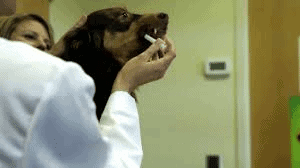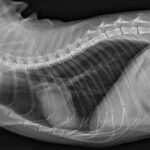(Also called Infectious Tracheobronchitis)
What is Kennel Cough?

Kennel cough describes a complex of which the primary agent is a bacterial organism known as Bordetella. But other organisms may be involved and associated with the bacteria and “hitch” a ride into the airways. The organisms can be bacteria-like or viral.
Kennel cough is an infectious bronchitis of dogs characterized by a harsh, hacking cough that most people describe as sounding like “something stuck in my dog’s throat.” This bronchitis may not last long and be mild enough to not need any treatment, or it may progress to a life-threatening pneumonia depending on which infectious agents are involved and the patient’s immunological strength.
An uncomplicated kennel cough lasts about a 7-9 days and entails frequent fits of coughing in a dog who otherwise feels active and normal. Uncomplicated cases do not involve fever or listlessness, just lots of coughing.
Agents that commonly accompany the bacteria Bordetella bronchiseptica include:
- Parainfluenza virus
- Adenovirus type 2
- Canine distemper virus
- Canine influenza virus
- Canine herpesvirus (very young puppies)
- Mycoplasma canis (a single-cell organism that is neither virus nor bacterium)
- Canine reovirus
- Canine respiratory coronavirus.
The classical combination for uncomplicated kennel cough is infection with parainfluenza or adenovirus type 2 in combination with Bordetella bronchiseptica. Infections involving the distemper virus, Mycoplasma species, or canine influenza are more prone to progressing to pneumonia, but pneumonia can readily result in any dog or puppy that is sufficiently young, stressed, or debilitated.
Not sure what a Coughing Dog sounds like?
A dry non-productive cough that occurs with uncomplicated kennel cough, literally sounds like your dog is trying to clear his or her throat. Sometimes they cough so intensely that they cough up a bit of froth from the stomach, leading some owners to think the dog is vomiting.
How Infection Occurs
An infected dog sheds infectious bacteria and/or viruses in respiratory secretions. These secretions become aerosolized and float in the air where they can be inhaled by a healthy dog. Obviously, crowded housing and suboptimal ventilation play important roles in the likelihood of transmission but organisms may also be transmitted on toys, food bowls or other objects.
The list below increases the risk of a dog catching a respiratory infection such as kennel cough:
- shipping stress
- crowding stress
- heavy dust exposure
- cigarette smoke exposure
- infectious agents (as listed previously)
- cold temperature
- poor ventilation.
Because it is common for Bordetella to be accompanied by at least one other infectious agent (such as one of the viruses listed below), kennel cough is actually a complex of infections rather than infection by one agent.
Classically, dogs get infected when they are kept in a crowded situation with poor air circulation and lots of warm air (i.e., a boarding kennel, vaccination clinic, obedience class, local park, animal shelter, animal hospital waiting room, or grooming parlor). In reality, most causes of coughing that begin acutely in dogs are due to infectious causes and usually represent some form of kennel cough.
The incubation period is 2 to 14 days. Dogs are typically sick for 7-9 days. Infected dogs shed Bordetella organism for 2 to 3 months following infection.
How is Diagnosis Made?
A coughing dog that has a poor appetite, fever, and/or listlessness should be evaluated for pneumonia.
Usually the history of exposure to other dogs ranging from dog parks, daycare, boarding, grooming etc. gives your veterinarian an idea of your pet’s social history. This, the symptoms and the proper time frame, is adequate to make the diagnosis.
If symptoms are more severe, radiographs or x-rays should be done to rule out pneumonia. There are also laboratory tests that can amplify DNA from a swab of your dog’s conjunctiva and make a definitive diagnosis.
How is Kennel Cough Treated?
An uncomplicated case of kennel cough will go away by itself, although cough suppressants can improve patient comfort while the infection is resolving. There are antibiotics that can help clear the bacterial infection and help prevent secondary infection with other bacteria should the airways get more irritated.
In an uncomplicated case, the dog should be clearly improved, if not recovered, after about a week. That said, if the symptoms progress, other more serious agents may be involved and your veterinarian will likely recommend additional testing and treatment.
Prevention through Vaccination

Nasal Vaccine
Vaccination is only available for: Bordetella bronchiseptica, canine adenovirus type 2, canine parainfluenza virus, canine distemper, and canine influenza. Infections with other members of the kennel cough complex cannot be prevented. Vaccine against adenovirus type 2, parainfluenza, and canine distemper is generally included in the basic puppy series and subsequent boosters (the DHPP or distemper-parvo shot). For Bordetella bronchiseptica, vaccination can either be given as a separate injection or as a nasal immunization. There is some controversy regarding which method provides a better immunization or if a combination of both formats is best.
Intranasal vaccination may be given as early as 3 weeks of age and immunity generally lasts 12 to 13 months. The advantage is that the local immunity is stimulated right at the site where the natural infection would try to take hold.
It takes four days to generate a solid immune response after intranasal vaccination, so it is best if vaccination is given at least four days prior to the exposure. Some dogs will have some sneezing or nasal discharge in the week following intranasal vaccination; this should clear up on its own. As a general rule, nasal vaccination provides faster immunity than injectable vaccination.
Nasal vaccines for Bordetella generally also include vaccine against parainfluenza virus and some also include vaccine against adenovirus type 2.
Oral Vaccine
An oral vaccine is available for Bordetella bronchiseptica (but not adenovirus or parainfluenza). The idea is that it is easier to give the vaccine with a syringe in the mouth – just inside the cheek – and there is no concern about sneezing out some of the vaccine. The oral vaccine can be given to puppies as young as 8 weeks of age. The vaccine is given yearly.
Injectable Vaccine
Injectable vaccination is a good choice for aggressive dogs who may bite if their muzzle is approached. For puppies, injectable vaccination provides good systemic immunity as long as two doses are given (approximately one month apart) after age 4 months. Boosters are generally given annually. Some dogs experience a small lump under the skin at the injection site. This should resolve without treatment.
Vaccination is not useful in a dog already incubated for kennel cough.
Bordetella bronchiseptica vaccination may not prevent infection. In some cases, vaccination minimizes symptoms of illness but does not entirely prevent infection. This is true whether nasal, oral or injectable vaccine is used.
Dogs that have recovered from Bordetella bronchiseptica are typically immune to reinfection for 6 to 12 months.
If you have questions about a coughing dog, do not hesitate to bring them to your veterinarian.


